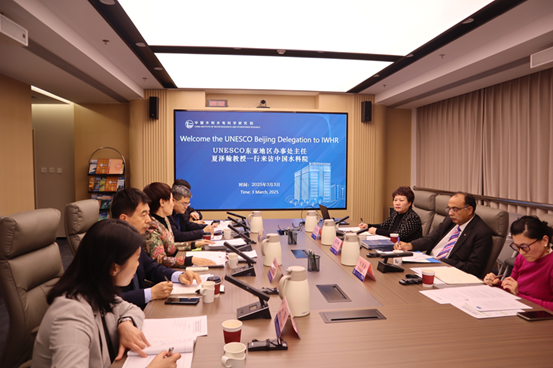A delegation from UNESCO Regional Office for East Asia, led by its director, Professor Shahbaz Khan, visited IWHR on March 3 to discuss deepening collaboration in water-related education, research, and culture initiatives.

IWHR and UNESCO have enjoyed a longstanding partnership, having jointly developed the Water Education Series, an English-language popular science book series for kids and teenagers aimed at enhancing global water literacy. The three volumes (Water Education for kids, children, and teenagers) are now available in UNESCO's e-library and have been translated into Khmer, French, and Spanish. Building on this initiative, the two sides have worked together to introduce water education programs in schools across Kenya, Cambodia, and Laos.
Recognizing the crucial role of water science in achieving Sustainable Development Goal 6 (SDG 6), IWHR and UNESCO are co-developing the World Water Science Report. Under the frameworks of the Intergovernmental Hydrological Programme (IHP) and the International Sediment Initiative (ISI), the two sides are exerting joint efforts to advance global technical exchanges on soil erosion and sediment research.
In the field of water culture, IWHR and UNESCO have been co-hosting the International Symposium on Water Culture annually since 2021, fostering in-depth discussions on water heritage, ancient civilizations, and canal development. The two sides have been working together to promote river ethics on the global stage, highlighted with the release of the multilingual report titled River Ethics and China’s Practices. Published in French, Spanish and Arabic, the report extends the reach of China’s water governance philosophies to a broader international audience.
IWHR will further participate in UNESCO events and activities within the framework of IHP, affirmed the institute’s president Dr. Peng Jing. The two sides will also collaborate on cutting-edge technologies such as artificial intelligence and explore their applications through UNESCO’s Open Science Platform.
The two sides also plan to co-host and co-organize a series of international conferences and formalize their cooperation through Memorandums of Understanding, according to the discussion.